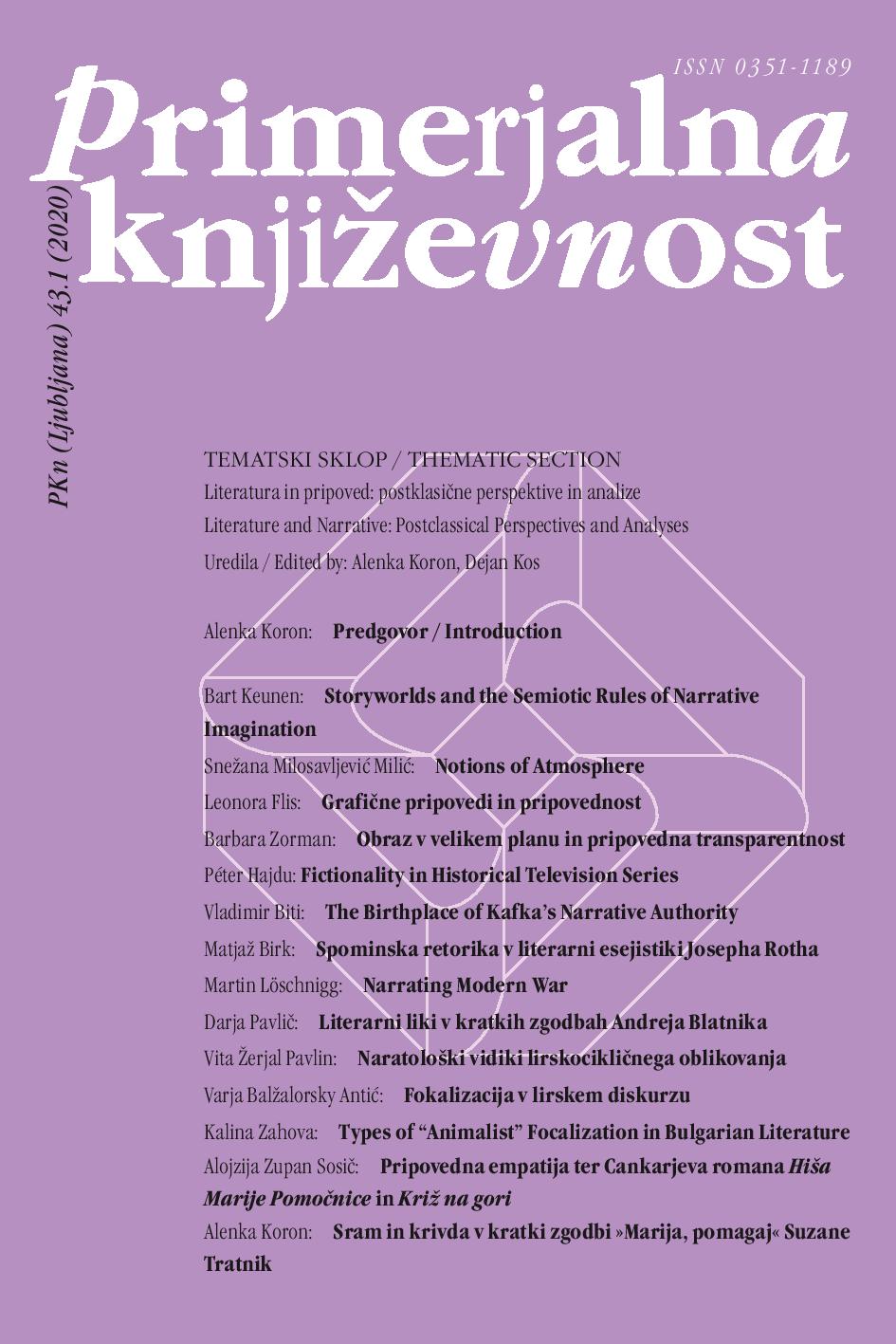State of Exception: The Birthplace of Kafka’s Narrative Authority
DOI:
https://doi.org/10.3986/pkn.v43.i1.06Keywords:
Austria-Hungary, Central European literature, literary periphery, Kafka, Franz, literary characters, outsiders, subversivityAbstract
Across the postimperial East Central Europe, whose geopolitical space was reconfigured on the model of West European nation-states, unprocessed human residues proliferated as the collateral effects of politically guided national homogenizations. These positional outsiders, who were prevented from becoming legible within the newly established political spaces, take center stage in Kafka’s narratives, not only in the form of their characters but also their narrators and ultimate authority. They passionately attach themselves to the zones of indistinction, which the modern societies’ “egalitarian discrimination” has doomed them to, thus trying to turn their enforced dispossession into a chosen self-dispossession. I argue that Kafka’s narratives owe their elusive ultimate authority precisely to this persistent translation of the political state of exception of his agencies into their literary state of exemption. They are at constant pains to transfigure the imposed state of exception through its peculiar fictional adoption, but Kafka’s ultimate narrative authority nevertheless takes care to keep an edge over their efforts. It is precisely this never-ending gradation of subversive mimicry in Kafka’s works that his postcolonial successor J. M. Coetzee most admired.
References
Agamben, Giorgio. State of Exception. Trans. Kevin Attell. Chicago: The University of Chicago Press, 2005.
Anderson, Benedict. Imagined Communities: Reflections on the Origin and Spread of Nationalism. Rev. and ext. edition. London: Verso, 1991.
Bergengruen, Maximilian. “Vor dem Gesetz sind alle Staatsbürger gleich?: Rechtsgrundsatz und Gesetzesfiktion in Kafkas Türhüter-Legende.” Deutsche Vierteljahrschrift für Literaturwissenschaft und Geistesgeschichte 90.3 (2016): 415–434.
Coetzee, John Maxwell. “Time, Tense, and Aspect in Kafka’s ‘The Burrow.’” Doubling the Point: Essays and Interviews. Cambridge, MA and London: Harvard University Press, 1992. 210–232.
Coetzee, John Maxwell. Disgrace. London: Secker & Warburg, 1999.
Coetzee, John Maxwell. Elizabeth Costello. London: Vintage, 2004.
Cohen, Gary B. “Our Laws, Our Taxes, and Our Administration: Citizenship in Imperial Austria.” Shatterzone of Empires: Coexistence and Violence in the German, Habsburg, Russian and Ottoman Borderlands. Eds. Omer Bartov and Eric D. Weitz. Bloomington and Indianapolis: Indiana University Press, 2013. 103–121.
Foucault, Michel. Discipline and Punish: The Birth of the Prison. Trans. Alan Sheridan. New York: Vintage, 1977.
Friedman, Lawrence M. “Lexitainment: Legal Process as Theater.” DePaul Law Review 50.2 (2000): 539–558.
Hegel, Georg Wilhelm Friedrich. Aesthetics: Lectures on Fine Art. 1. Trans. T. M. Knox. Oxford: Oxford University Press, 1975.
Judson, Pieter. The Habsburg Empire: A New History. Cambridge, MA and London: The Belknap Press of Harvard University Press, 2016.
Kafka, Franz. “Beim Bau der chinesischen Mauer.” Beim Bau der chinesischen Mauer und andere Schriften aus dem Nachlass. Gesammelte Werke in zwölf Bänden. 6. Ed. Hans-Gerd Koch. Frankfurt am Main: Fischer, 1994. 65–80.
Kafka, Franz. Briefe 1902–1924. Ed. Max Brod. Frankfurt am Main: Fischer, 1966.
Kafka, Franz. Der Proceß. In der Fassung der Handschrift. Gesammelte Werke in zwölf Bänden. 3. Ed. Hans-Gerd Koch. Frankfurt am Main: Fischer, 1994.
Kafka, Franz. Diaries 1910–1923. Trans. J. Kresh and M. Greenberg. New York: Schocken Books, 1988.
Kafka, Franz. “The Great Wall of China.” The Complete Stories. Trans. W. and E. Muir. New York: Schocken Books, 1988. 266–279.
Kafka, Franz. “The Problem of Our Laws.” The Complete Stories. Trans. W. and E. Muir. New York: Schocken Books, 1988. 482–483.
Kafka, Franz. “The Refusal.” The Complete Stories. Trans. W. and E. Muir. New York: Schocken Books, 1988. 295–300.
Marais, Mike. The Secretary of the Invisible: The Idea of Hospitality in the Fiction of J. M. Coetzee. Amsterdam and New York: Rodopi, 2009.
Schmitt, Carl. Political Theology. Trans. George Schwab. Cambridge: MIT Press, 1985.
Slaughter, Joseph R. Human Rights, Inc. New York: Fordham University Press, 2007.
Stourzh, Gerald. “Ethnic Attribution in Late Imperial Austria: Good Intentions, Evil Consequences.” The Habsburg Legacy: National Identity in Historical Perspective. Eds. Ritchie Robertson and Edward Timms. Edinburgh: Edinburgh University Press, 1994. 67–83.
Wetzell, Richard F. Inventing the Criminal. Chapel Hill: University of North Carolina Press, 2000.
Wittgenstein, Ludwig. Notebooks 1914–1916. Eds. G. H. von Wright and G. E. M. Anscombe. Chicago: University of Chicago Press, 1980.
Ziolkowski, Theodore. The Mirror of Justice: Literary Reflections of Moral Crisis. Princeton and Oxford: Princeton University Press, 1997.


